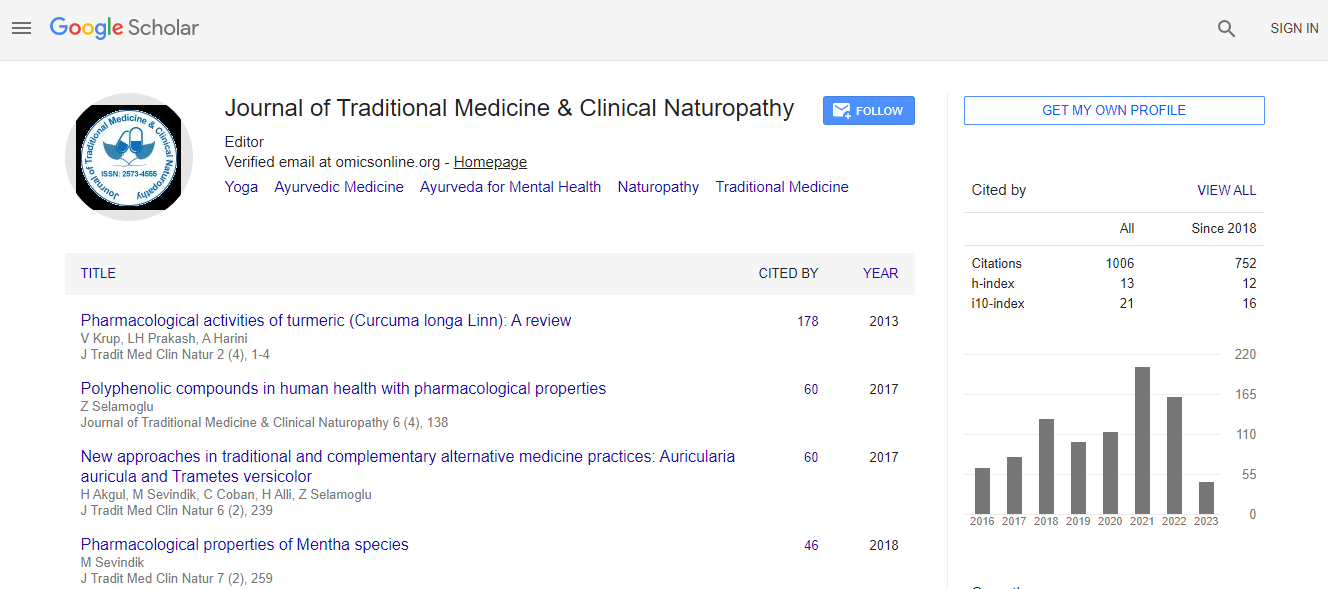Our Group organises 3000+ Global Conferenceseries Events every year across USA, Europe & Asia with support from 1000 more scientific Societies and Publishes 700+ Open Access Journals which contains over 50000 eminent personalities, reputed scientists as editorial board members.
Open Access Journals gaining more Readers and Citations
700 Journals and 15,000,000 Readers Each Journal is getting 25,000+ Readers
Google Scholar citation report
Citations : 1504
Journal of Traditional Medicine & Clinical Naturopathy peer review process verified at publons
Indexed In
- CAS Source Index (CASSI)
- Google Scholar
- Sherpa Romeo
- Open J Gate
- Genamics JournalSeek
- RefSeek
- Directory of Research Journal Indexing (DRJI)
- Hamdard University
- EBSCO A-Z
- Publons
- Geneva Foundation for Medical Education and Research
- Euro Pub
- ICMJE
Useful Links
Recommended Journals
Related Subjects
Share This Page
The intuitive rational-choice theory of madness: Schizophrenia, criminal insanity and neuroses; the fallen empires of psychoanalysis, medical models and drug companies
Joint Event on Global Summit on Traditional & Restorative Medicine & 10th World Congress on Neuropharmacology
Yacov Rofe
Bar-Ilan University, Israel
Keynote: J Tradit Med Clin Natur
Abstract
The book, The Intuitive Rational-Choice Theory: Schizophrenia, Criminal Insanity and Neuroses, presents a new theory which explains the development and treatment of schizophrenia and criminal insanity as rational coping mechanisms. Based on the strong relationships between schizophrenia and neurological impairments, medical models took for granted that all cases of schizophrenia result from neurological impairments, even when there was no evidence, as in the case the Unabomber and John Nash. The new theory, termed also Psych-Bizarreness Theory, demonstrates that it can explain all cases of schizophrenia, regardless whether they suffer from neurological damages or not, as well as criminal insanity and neurotic disorders, by conscious-rational terms. According to the new theory, when individuals are confronted with extreme levels of stress, irrespective of whether the source of the stress is neurological or environmental, their behavioral options become limited: They can commit suicide, develop a drug abuse, use aggression to eliminate the stressor, or intuitively choose certain mad/bizarre behaviors diagnosed by five empirical criteria (Rofé, 2000, 2016), that suite their coping demands. Madness is seen primarily as a repressive coping mechanism, which individuals intuitively choose when confronted with unbearable levels of stress. Thus, contrary to psychoanalysis, madness cause repression rather than vice versa. The choice of a specific mad behavior is determined by the same three principles which guide the consumer's decision-making process when purchasing a certain product. The major principal is the need controllability: The specific mad behavior must increase the patient's ability to exercise control over the stressor and\ or provide certain desired privileges. The second guiding principle is availability: The choice of the specific symptom is affected by various channels of information, such as the media, personal experiences, genetic predispositions, family and peers that increase the saliency of certain suitable behaviors. The third principle is cost-benefit analysis: The mad behavior is chosen only if the individual intuitively feels that it will reduce the level of his or her emotional distress. Although the decision to implement the intuitive/unconscious choice is conscious, patients become unaware of the Knowledge of Self-Involvement (KSI) through a variety of cognitive processes that disrupt the encoding of this knowledge and a number of memory inhibiting mechanisms that cause its forgetfulness. Subsequently, utilizing their socially internalized beliefs regarding the causes of psychological disorders, patients develop a self-deceptive belief which attributes the cause of their symptoms to factors beyond their conscious control. The new theory proved its ability to integrate all therapeutic methods pertaining to neurosis into one theoretical framework (Rofé, 2010), explaining all data relevant to the development and treatment of conversion disorder, including neurological findings, which seemingly support the medical explanation of this disorder (Rofé & Rofé, 2013), and resolves the theoretical confusion regarding the explanation of phobia by distinguishing between bizarre (e.g., agoraphobia and chocolate phobia) and non-bizarre phobia, such as dog phobia (Rofé, 2015). Robert Aumann, the Nobel Prize-winning Economist, noted in a letter of recommendation to publishers of the present book (2017), Rofé's theory is as "revolutionary as it sounds, fits well into the frameworks of economics, game theory, and evolution".Biography
Yacov Rofé is a professor of psychology at Bar-Ilan University, Ramat-Gan, Israel. He completed his first and second degrees in psychology at Bar-Ilan University and received his PhD from Hull University, England, in 1973. He held the position of chair of the interdisciplinary department of social sciences at Bar-Ilan University for fifteen years. Rofé was a visiting professor at both Rutgers Medical School in New Jersey and Washington University in St. Louis, Missouri. He has published many articles in leading academic journals of psychology, including a theory entitled “Stress and Affiliation: a Utility Theory”, published by Psychological Review in 1984. An additional influential article, published in Review of General Psychology, 2008, is a review that refutes the existence of repression and the Freudian Unconscious.
E-mail: jacov.Rofe@biu.ac.il

 Spanish
Spanish  Chinese
Chinese  Russian
Russian  German
German  French
French  Japanese
Japanese  Portuguese
Portuguese  Hindi
Hindi 
